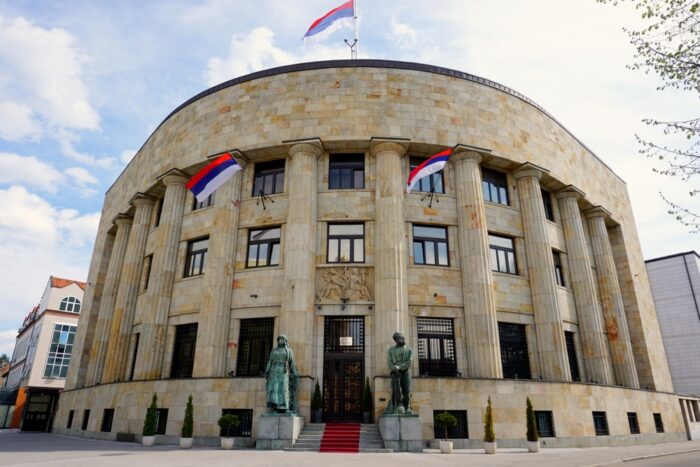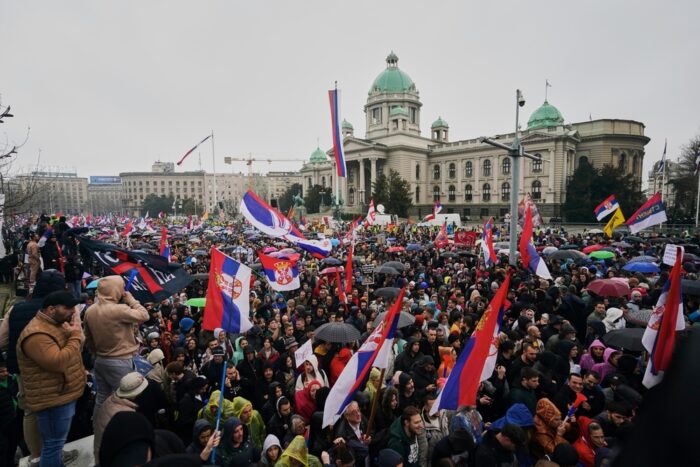The Progressive Post
The EU should enlarge to the Western Balkans now

The EU needs a new policy towards the Western Balkans. It should enlarge to all countries of the region now if it wants to prevent other powers from taking advantage. Left without a concrete prospect of joining the EU, the countries of the Western Balkans are becoming less European and less democratic.
The European Union ought to radically rethink its approach towards the Western Balkans. Keeping this region almost permanently in the waiting room for a train that never comes is making the Western Balkan countries less pro-European than at any time in the last ten or twenty years, and also much less democratic. Waiting for EU membership is like waiting for the Godot – and it makes the Western Balkan countries every day more similar to contemporary Turkey, another country that has moved away from the West because of feeling betrayed, excluded and humiliated by the EU’s permanent hesitation over the country’s accession. The consequences of the Western Balkans being kept out of the European Union are authoritarianism, the rise and consolidation of nationalism, corruption, and an attraction to alternative models of governance – such as those promoted in Russia, Turkey and China.
Instead of trying to find new excuses and justifications for delaying accession for the Western Balkans, the EU should actively engage with – and open its doors to – these five (or six, depending on the status of Kosovo) countries that have a joint population of less than 20 million. Although this would be a risky move – given the structural problems of each of these countries, as well as the fact that further enlargement is not popular in the current EU member states – it would nevertheless be much more dangerous for the EU to leave the Western Balkans outside the European bloc, and thus exposed to the ambitious and assertive foreign policy of competitors whose objective is to harm the interests of the European Union by preventing the completion of European integration. The EU will not be complete until it includes all countries that (still) want to join. The Yugoslav wars of the 1990s were the main reason that the promise of a united Europe did not materialise back in 2004, when ten new member states joined the bloc. These wars were also the main reason for America staying in Europe as a powerful actor, even though US interests are not always compatible with the project of European unity, as shown by the four years of Donald Trump’s presidency.
Europe had good reasons to feel offended by the rejection of the principles of peace and democracy in former Yugoslavia and its successor states. Instead of resulting in the unquestioned dominance of the EU in Europe, the Yugoslav wars left the European bloc facing competitors for power – not only in the Western Balkans but also in the post-Soviet space (for example, Ukraine and Belarus) and, indirectly, in the southern Mediterranean.
A stronger Russia and a stronger China, as well as the US being sceptical towards the EU, have already created dissonance among the EU member states. Instead of a united Europe we now have a more complex situation in which the EU is competing for strategic influence in its own backyard. The new competitors – present also in the Western Balkans – now include the post-Brexit UK, as well as several Arab states and Israel. Most of them seek opportunities to challenge the project of European unity.
However, anger and revenge are not good allies for responsible political judgment. And nor are pride and prejudice – pride with regard to European values that are promoted as being universal and superior to alternatives; and prejudice against others, especially inspired by orientalist images and assumptions. Although the EU was boosted by the self-declared definitive historical victory of liberalism over all other alternatives, the European Union failed to secure a liberal peace in the 1990s. It also failed to radically transform societies, even in central and eastern Europe, as witnessed by the return of illiberal policies, right-wing ideas and sovereignism as alternatives to Europeanism in countries such as Hungary, Poland and – recently – Slovenia.
If the EU hasn’t been very successful in the Europeanisation of societies back then, it is even less likely that it could succeed now, given that it is confronted with both external and internal obstacles. It is therefore an illusion that enlargement of the EU can reasonably – or even should – depend on how successful EU candidate countries are in fulfilling unrealistic criteria that are impossible to achieve, and most of which focus on the liberalisation of domestic politics.
Instead, the EU should act more strategically. It will not sink if it includes the Western Balkans. If it wants to become a global actor in an increasingly competitive and multipolar arena, it needs to act as a global power. It should enlarge when and where it can. It can still do this in the Western Balkans – unlike in the post-Soviet space or the southern Mediterranean. Hesitation to do so is a sign of weakness, and might become fatal for the European project.
This does not, of course, mean that the EU should not care about the character of states and societies within its own borders. Europe is meaningless if it does not have a character. And this character should indeed be decided by the values of the Enlightenment, which include both liberal and social-democratic values, as well those of secularism, democracy, freedom and equality. The character of the EU also includes strengthening its anti-war dimension. But all these character traits could be reinforced much more successfully if the countries of the Western Balkans were included as full members in the EU’s decision-making. Only when these countries feel welcome and equal, respected as the subject of politics, and not treated as the objects of it, can they gradually advance in democracy. The policy of blaming and shaming should be replaced with a policy of trusting and sharing – sharing the responsibilities for the common European home instead of widening the already big gap between core Europe and its periphery.
Countries in the Western Balkans are not perfect – far from it. But are all the member states of the EU perfect? Would they all now pass the test that Europe demands of the candidate countries? And from the point of liberal democracy, will the Western Balkans become better or worse if left out in the cold?
The EU should allow the Western Balkan countries to join the European bloc now – and together, not one by one. Individual accession encourages unhealthy competition between the candidates, and in the Western Balkans this prevents reconciliation. Those countries that join the EU first will try to use their membership to prevent the others from joining. We have already seen this tactic at play when Slovenia tried to block Croatia, and when Greece blocked North Macedonia. Indeed, we are now seeing a similar tactic by Bulgaria towards North Macedonia. These blocking tactics will continue on the part of Croatia towards Bosnia-Herzegovina, Montenegro and Serbia, when and if their time comes.
The European project almost came to a halt with the wars in the Western Balkans in the 1990s. Now is the time to unblock it again with a brave new policy of inclusion – for strategic reasons as well as for those of promoting European values.
Related articles:
Fixing the ethics of enlargement, by Florent Marciacq




